Orw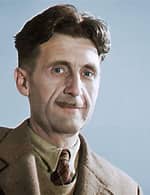 ell did not figure in The Culture Vulture`s original top five writers on Spain. He sort of overlooked him because he only wrote one book on the country, Homage to Catalonia. Yet, on reflection the CV considers that Orwell is worthy to stand alongside his original fifth choice, Giles Tremlett, or even to leapfrog him.
ell did not figure in The Culture Vulture`s original top five writers on Spain. He sort of overlooked him because he only wrote one book on the country, Homage to Catalonia. Yet, on reflection the CV considers that Orwell is worthy to stand alongside his original fifth choice, Giles Tremlett, or even to leapfrog him.
Biography
George Orwell was born Eric Arthur Blair on 25 June 1903 and died at the age of 46 on 21 January 1950. He was an English novelist, essayist, journalist, and critic. His work is characterised by lucid prose, social criticism, opposition to totalitarianism, and support of democratic socialism.
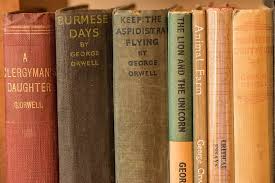 He is particularly known for the allegorical novella Animal Farm (1945) and the dystopian novel Nineteen Eighty-Four (1949).
He is particularly known for the allegorical novella Animal Farm (1945) and the dystopian novel Nineteen Eighty-Four (1949).
His non-fiction works, including Down and Out in Paris and London (1933), about his experiences living as a dishwasher in the French capital and as a tramp in England, The Road to Wigan Pier (1937), documenting his experience of working-class life in the industrial north of England, and Homage to Catalonia (1938), an account of his experiences soldiering for the Republicans in the Spanish Civil War (1936–1939), are as critically respected as his essays on politics, literature, language and culture.
Blair was born in India, and raised and educated in England. After school he became an Imperial policeman in Burma (now Myanmar), before returning to Suffolk, England, where he began his writing career as George Orwell, a name inspired by a favourite location, the River Orwell.
From the late 1920s to the early 1930s, his success as a writer grew and his first books were published. He was wounded fighting in the Spanish Civil War, leading to his first period of ill health on return to England.
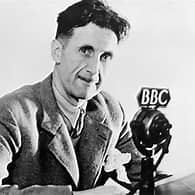 During the Second World War he worked as a journalist and for the BBC. The publication of Animal Farm led to fame during his lifetime. During the final years of his life he worked on Nineteen Eighty-Four, and moved between Jura in Scotland and London. It was published in June 1949, less than a year before his death.
During the Second World War he worked as a journalist and for the BBC. The publication of Animal Farm led to fame during his lifetime. During the final years of his life he worked on Nineteen Eighty-Four, and moved between Jura in Scotland and London. It was published in June 1949, less than a year before his death.
Orwell married Eileen O'Shaughnessy on 9 June 1936. Shortly afterwards, the political crisis began in Spain and Orwell followed developments there closely. At the end of the year, concerned by General Francisco Franco's military uprising (supported by Nazi Germany, Fascist Italy and local groups such as the Falange), Orwell decided to go to Spain to take part in the Spanish Civil War on the Republican side.
Spanish Civil War
Orwell set out for Spain on about 23 December 1936, dining with auther Henry Miller in Paris on the way. Miller told Orwell that going to fight in the Civil War out of some sense of obligation or guilt was "sheer stupidity" and that the Englishman's ideas "about combating Fascism, defending democracy, etc., etc., were all baloney".
A few days later in Barcelona, Orwell met John McNair of the Independent Labour Party (ILP) who quoted him: "I've come to fight against Fascism", but if someone had asked him what he was fighting for, "I should have answered: 'Common decency'".
Orwell stepped into a complex political situation in Catalonia. The legitimate Republican government was supported by a number of factions with conflicting aims.
Orwell was at first exasperated by this "kaleidoscope" of political parties and trade unions, "with their tiresome names". The ILP was linked to the POUM – Partido Obrero de Unificación Marxista, so Orwell joined them.
At first there was very little military action and Orwell was shocked by the lack of munitions, food and firewood, as well as other extreme deprivations.
With his Cadet Corps and police training, Orwell was quickly made a corporal.
Meanwhile, back in England, Eileen had been handling the issues relating to the publication of The Road to Wigan Pier before setting out for Spain herself. Eileen volunteered for a post with John McNair in the ILP office and with help paid visits to her husband, bringing him English tea, chocolate and cigars.
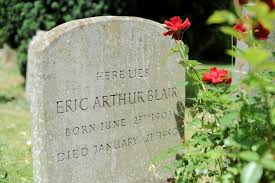 Orwell had to spend some days in hospital with a poisoned hand and had most of his possessions stolen by the staff. He returned to the front and saw some action in a night attack on the Nationalist trenches where he chased an enemy soldier with a bayonet and bombed an enemy rifle position.
Orwell had to spend some days in hospital with a poisoned hand and had most of his possessions stolen by the staff. He returned to the front and saw some action in a night attack on the Nationalist trenches where he chased an enemy soldier with a bayonet and bombed an enemy rifle position.
In April, Orwell returned to Barcelona. Wanting to be sent to the Madrid front, which meant he "must join the International Column", he approached a Communist friend attached to the Spanish Medical Aid and explained his case.
“Although he did not think much of the Communists, Orwell was still ready to treat them as friends and allies. That would soon change."
The campaign of lies and distortion waged by the Communist press, in which the POUM was accused of collaborating with the fascists, had a dramatic effect on Orwell. Instead of joining the International Brigades as he had intended, he decided to return to the Aragon Front.
There he was wounded in the throat by a sniper's bullet. At 6 ft 2 in (1.88 m), Orwell was considerably taller than the Spanish fighters and had been warned against standing against the trench parapet.
He recovered sufficiently in hospital to get up and on 27 May 1937 was sent on to a POUM sanatorium in the suburbs of Barcelona. The bullet had missed his main artery by the barest margin and his voice was barely audible. He was declared medically unfit for service.
With all the Republican in-fighting the Orwells escaped from Spain by train and returned to England. On 13 July 1937 a deposition was presented to the Tribunal for Espionage & High Treason in Valencia, charging the Orwells with "rabid Trotskyism", and being agents of the POUM. The trial of the leaders of the POUM and of Orwell (in his absence) took place in Barcelona in October and November 1938.
Observing events from French Morocco, Orwell wrote that “from the start every kind of lie, including flagrant absurdities, has been circulated in the Communist press." 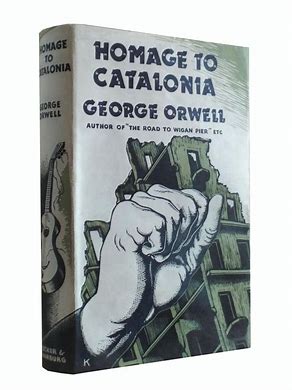
Orwell's experiences in the Spanish Civil War gave rise to Homage to Catalonia (1938).
In his book, The International Brigades: Fascism, Freedom and the Spanish Civil War, Giles Tremlett writes that according to Soviet files, Orwell and his wife Eileen were spied on in Barcelona in May 1937. "The papers are documentary evidence that not only Orwell, but also his wife Eileen, were being watched closely".
Orwell returned to England in June 1937, and settled down to animal husbandry and writing Homage to Catalonia.
Homage to Catalonia was published by Secker & Warburg in 1938 and was a commercial flop.
Following his experiences as a militiaman in the Spanish Civil War, Orwell wrote: “Every line of serious work that I have written since 1936 has been written, directly or indirectly, against totalitarianism and for democratic Socialism as I understand it".
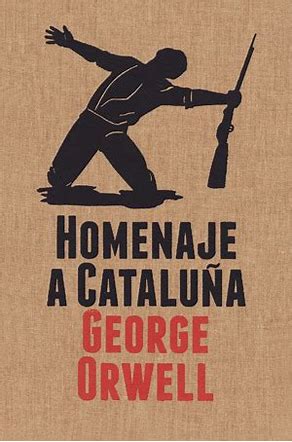 In Homage to Catalonia he brings to bear all the force of his humanity, passion and clarity, describing with bitter intensity the bright hopes and cynical betrayals of that chaotic episode: the revolutionary euphoria of Barcelona, the courage of ordinary Spanish men and women he fought alongside, the terror and confusion of the front, his near-fatal bullet wound and the vicious treachery of his supposed allies.
In Homage to Catalonia he brings to bear all the force of his humanity, passion and clarity, describing with bitter intensity the bright hopes and cynical betrayals of that chaotic episode: the revolutionary euphoria of Barcelona, the courage of ordinary Spanish men and women he fought alongside, the terror and confusion of the front, his near-fatal bullet wound and the vicious treachery of his supposed allies.
A first-hand account of the brutal conditions of the Spanish Civil War, George Orwell's Homage to Catalonia has made a significant contribution to my understanding of that conflict, and to that of countless others.
I have also read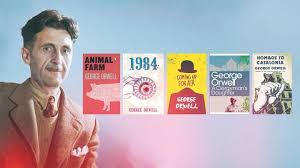 The Road to Wigan Pier, Keep the Aspidistra Flying, Down and Out in Paris and London and, of course, Animal Farm and Nineteen Eighty-Four.
The Road to Wigan Pier, Keep the Aspidistra Flying, Down and Out in Paris and London and, of course, Animal Farm and Nineteen Eighty-Four.
A great writer, indeed.
His contribution to the English language, in the form of words and phrases, mainly from Nineteen Eighty-Four, is astonishing: Room 101, Big Brother, newspeak, doublethink, the Thought Police, unperson and thoughtcrime are some examples.
The term Cold War is also attributed to Orwell.
He died young, at 46, after a life plagued by ill health. But what a legacy, Mr Blair!
© The Culture Vulture
Acknowledgements:
Amazon
Bing
Google
Wikipedia
Tags: Animal Farm, Big Brother, Cold War, Culture Vulture, doublethink, Down and Out in Paris and London, Elaine O'Shaughnessy, Eric Blair, General Francisco Franco, George Orwell, Homage to Catalonia, ILP, International Brigades, International Labour Party, Keep the Aspidistra Flying, newspeak, Nineteen Eighty-Four, POUM, Room 101, Spanish Civil War, The Road to Wigan Pier, thoughtcrime, Thought Police, unperson